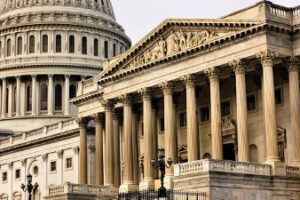
We Americans harbor a huge dichotomy in our attitudes toward our country. We display our patriotism in borderline chauvinistic manner, playing the national anthem before every major sporting event, and church services frequently include impassioned praise of our nation and sometimes promote the idea that loyalty to god must include equal loyalty to the country.
We Americans, myself included, love our country. It’s surprising that many of my fellow citizens hate our government. It’s a pejorative to call someone a politician. Candidates for office who have no government experience proudly run as ‘outsiders’ and often easily win a seat. Americans do not recognize popular public programs as government created and sponsored by Washington. I’ve heard more than once the demand, “Keep government out of my Medicare,” which is, of course, a government program. President Ronald Reagan was cheered when he told us, “Government is not the solution to our problem, government is the problem.” Americans perceive correctly that the government does not represent all the people.
The seeds of this animosity were planted in our founding document, the Constitution. The government claims to represent the people, but it was never set up to reflect the popular will. To assure the southern, agricultural states that they would not be overrun by the industrial North, our founders made a bicameral system, in which the lower house was representative of the population and the upper house was allowed two senators for each state. Moreover, the executive offices are decided by designated electors, who are now selected by popular ballot within the state, and their presidential vote is counted. Each state is allocated a number of votes based on population (varying from 1 to 53) and the 2 senators. Since 1982, the only Presidential election in which a Republican won the popular vote was 2004, George W. Bush’s second term. In Bush’s first term and Trump’s term, they were elected although they came in second in the popular vote. Bush gave us the Iraq War and Trump gave us, well, Trump.
These flaws in our system have been aggravated in recent years by social and demographic changes. Rural, white Americans have always tended to live in areas where they enjoyed extraordinary privilege. Our economy was built by slave labor in a system in which slaves had no rights at all. After the Civil War, southern Black Americans were free in name only, and equal in no way, especially not at the ballot box, where they were often turned away and frequently physically punished for attempting to vote.
Years later, much had changed, but for some, Obama’s presidency seemed too much to bear. In addition to demonstrations against him that included armed protesters, there were numerous threats against his life. The Republicans were quick to take advantage of this animosity. Senate Republican leader, Mitch McConnell, vowed, “The single most important thing we want to achieve is for President Obama to be a one-term president.” He did not succeed in that, but he was successful in establishing the idea that party comes before country.
This set the stage for Donald Trump, with all his shenanigans, culminating in his absurd claim that he was cheated out of the presidency in the 2020 election and that his supporters must fight to get it back. This is contrary to all information, all legal decisions (including those made by judges whom Trump had appointed to the bench), and any common sense. After the disastrous insurrection of early January 2021, it’s unlikely they will again find it necessary to take the country by force. In addition to the existing bias in our election system, state legislatures draw the boundaries of legislative districts, which often result in either Democrats or Republicans being underrepresented in Congress. Now, perhaps more than ever, the government does not represent the people.
https://www.youtube.com/watch?v=YcUDBgYodIE
Even if the people are willing to support the government, they’ll face more obstacles in the next election. Based on their false assertion that the election was stolen from Trump, (called by much of the press “The Big Lie”), states with Republican leadership have passed laws to suppress the vote. The Brennan Center for Justice posts that between January 1 and September 27, at least 19 states enacted 33 laws that make it harder for Americans to vote.
Biden and liberal Democrats have pushed major reforms, which the polls show to be very popular with the public. If they were to pass, Americans might rouse around our government and, in spite of the odds against them, regain a government of, by, and for the people. However, in this system, only a few of these reforms will pass, at best. In that case, the people will continue to see the government not representative of the popular will.
So, it’s a major understatement to say that the odds are against the United States’ preserving democracy. There are ways this could be turned around, but it would take great political courage on the part of our politicians and enormous political wisdom and will on the part of our people.
8,430 Total Views, 8 Views Today






